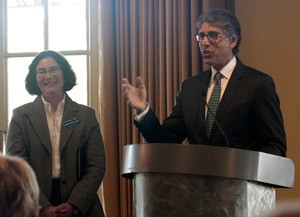Observations on conditions affecting companies doing business in Latin America were presented at a recent California Chamber of Commerce breakfast gathering by Ambassador Jamal Khokhar, president and CEO of the Institute of the Americas.
The March 4 talk and question-and-answer session covered topics ranging from the economy of Brazil, trade with Canada and Venezuela, to free trade agreements in general.
The Ambassador also described his experience attending the High-Level Economic Dialog on goals between the United States and Mexico, presided over by U.S. Vice President Joe Biden and Mexico Secretary of Finance Luis Videgaray Caso.
Khokhar previously served as Canada’s ambassador from Brazil, where he also served as a junior trade officer, so he used examples from Brazil to show how governance can affect trade matters.
Good Long-Term Prospects
The Ambassador said he remains “a fan of Brazil.” Businesses that play for the long-term and have the right local partners will do well there, he said.
Positives he identified include a “hugely dynamic consumer-based market” and a large manufacturing sector “with lots of uptick possibilities.”
Moreover, he said Brazilians are resolving their intellectual property questions, including those involving pharmaceutical companies.
Governance Matters
Brazil’s story, the Ambassador said, illustrates the importance of having the right policy structure and governance in place.
Once the sixth largest economic power in the world, Brazil had a negative growth rate the previous day, the Ambassador pointed out. The former president of Brazil has been arrested amid charges of corruption.
Just five years ago, Khokhar commented, Brazil was the second largest protein producer in the world, fourth largest auto manufacturer and the fourth largest aircraft producer. The country had both massive deep water offshore oil and gas resources and the technology to take them out.
Brazilian consumers are very sophisticated, and were among the highest consumers of tablets, cell phones, high-definition television, and top users of Instagram, Facebook and Twitter, he said. Moreover, a lot of New York fashion designers tried their ideas in Brazil first.

National Ethic
In meeting its economic challenges, the Ambassador said, Brazil is not going back to the military dictatorship that ran the country for 25 years. Brazilians are settled on democracy, he said.
Young people in Brazil also have changed expectations, he said. Going to the streets in August, 18- and 20-year-olds demanded things like better education, better public transportation and less corruption in government. Oneslogan, Khakhar said, illustrated the youth mindset: “A developed country is not a country where all the poor people drive cars, but it’s where all the rich people take public transportation.”
Infrastructure Challenges
A “hard infrastructure” problem facing Brazil is that its roads, ports and airports are “choking…breaking down,” Khokhar said.
Internal tension has arisen from the Brazilian government choosing to invest in building World Cup stadiums and Olympics facilities, rather than maintaining or upgrading existing infrastructure, he said. The nation also is making a bid to be a location for the World’s Fair.
The government made a good “soft infrastructure” investment by funding its Science without Borders program, Khokhar commented. The program paid for 100,000 of the nation’s best and brightest students to go abroad for instruction in science, technology, engineering and mathematics. Funding for the program fell victim to the fallout from the scandals, according to Khokhar.
Nevertheless, he said, Brazil is making a great effort to build up its hard and soft infrastructure, which creates opportunities for the international community.
More Information
The Institute of the Americas is a nonprofit founded in 1983 that works with the public and private sectors, nonprofit leaders and academia to promote economic development and social well-being in the hemisphere. For more information, see www.iamericas.org.
More information on trade with Brazil is available at www.calchamber.com/Brazil.


